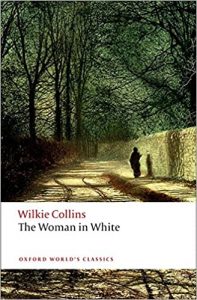 In my last post on The Woman in White, I ended with the following hashtags:
In my last post on The Woman in White, I ended with the following hashtags:
#PescaDeservesBetter #ButThenAgainALotOfCharactersDo #Laura #Anne #Marian
Why’s that you may ask? Well, we’ve already discussed why Pesca deserved better, but today I thought it would be a good idea to go back and think about the treatment of women in this novel. Particularly I’d like to focus on Marian.
When I first began reading The Woman in White, I had misread some information somewhere and was reading under the incorrect assumption that Wilkie Collins was a woman. However, I quickly realized my mistake after reading the first description of Marian. I thought, no way did a woman write this: “The instant my eyes rested on her, I was struck by the rare beauty of her form, and by the unaffected grace of her attitude. Her figure was tall, yet not too tall; comely and well-developed, yet not fat; her head set on her shoulders with an easy, pliant firmness; her waist, perfection in the eyes of a man, for it occupied its natural place, it filled out its natural circle, it was visibly and delightfully undeformed by stays. She had not heard my entrance into the room; and I allowed myself the luxury of admiring her for a few moments…The easy elegance of every movement of her limbs and body as soon as she began to advance from the far end of the room, set me in a flutter of expectation to see her face clearly… and I said to myself… The lady is ugly!” (pg. 31). He goes on to describe her masculine facial features and her expression as “bright, frank and intelligent” although “wanting in those feminine attractions of gentleness and pliability” (pg. 32). Is it sexist to say that only a man would write that? Because I really do think only a man could write that. Walter spends the longest time admiring her figure from afar and then sees that she has masculine facial features and is practically repulsed. It begs the question, why does it matter? Why is there such a focus on her appearance?
Marian was my favorite character in the novel because she is the closest representation to a strong female character. She is intelligent and reliable. In a lot of ways, she is the woman in the novel with the most agency. She is able to speak her mind more freely and isn’t tied to obey the wishes of a husband. It is perhaps her masculine features which allow men to listen to her – Walter and Fosco both really admired her intellect. Walter repeatedly trusts her to advise him and to take care of Laura in his absence. And yet at the same time, she uses her voice to says things like “How can you expect four women to dine together alone everyday, and not quarrel?” (pg. 33). I found the moments where she would refer to her inferiorness in comparison to men infuriating because they didn’t fit with the image of Marian I had in my head. On the one hand, the women in the novel understand that their options are limited because they are women (it was the Victorian era after all), however it seems as though Marian genuinely believes that she is lesser simply because she is a woman. I want to say that she is just saying these things so that men will listen to her, but it really does seem like she means it.
Marian is further limited by position of class and her unstable footing in Limmeridge. She doesn’t actually have much more of a choice than Laura or Anne have in determining their futures. In the end, Marian’s life is tied forever in service to her sister Laura. Perhaps this is what she would have wanted, but it’s the lack of choice that’s a problem. There was never once a question or consideration of her getting married. She knew it wasn’t an option. She wasn’t asked whether she wanted to stay with Laura and Walter and their children. It was decided for her.
So after her treatment the entire novel, I was surprised to find that it’s Marian who gets the last word. The last line of the novel is: “Marian was the good angel of our lives – let Marian end our story.”
Why would Collins give her the last word? Don’t get me wrong, I’m glad he did, but it almost seems out of place. Marian is given the last word when Laura was never given a word. The two are opposites in many ways. While Laura has the ability to do some things, such as get married (twice), Marian has the ability to do other things, such as have a voice.
I’d say that, ultimately Marian deserved better because she was so close. And yet, she never really had a chance. She did the best she could within the limitations of her class/status, but it seems she was only able to do the things she did because of her masculine qualities.
Thanks for reading! Until tomorrow,
Dessi
